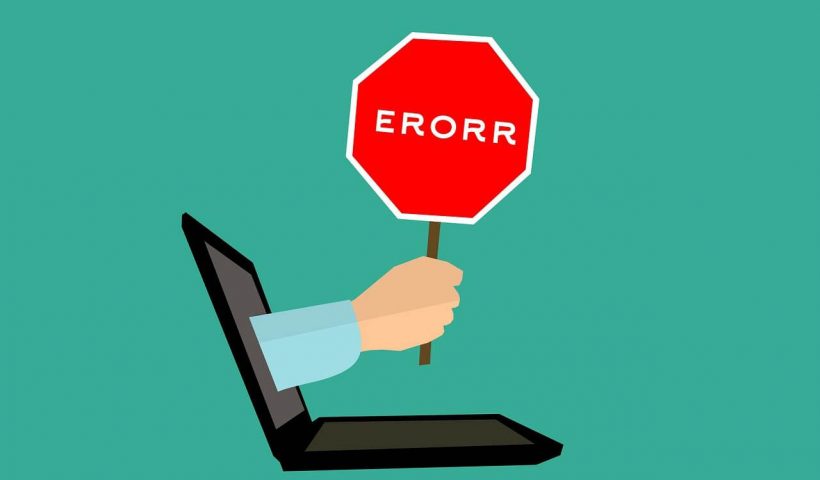10 Common Bookkeeping Mistakes That Can Cost You Hundreds Of Pounds

Correcting bookkeeping mistakes can be costly if you leave things for a long time. Why? Because a bookkeeper first has to understand what has happened within your business records. As they didn’t do the bookkeeping in the first place, this task can be quite time-consuming. They need to try and follow the thinking of the person who did the bookkeeping. There’s lots of detective work involved. The second step is making corrections to your business records which can take more time than doing the bookkeeping in the first place. Your bookkeeper has to be very careful here.
Let’s have a look at the most common bookkeeping mistakes to help you do your bookkeeping correctly going forward.
Not monitoring bank feeds
Automated bank feeds in accounting software are one of the best technological solutions. We love them. However, they need to be checked on a regular basis because at the end of the day it’s just a technology and things can fail for various reasons. Check your bank feed regularly and make sure your bank is still connected to your accounting software and you’re not missing any transactions. Our Oxford bookkeepers wouldn’t recommend going without checking your bank feeds longer than 3 months but if you monitor your business performance on a regular basis, once a month is a must.
Not understanding how cash withdrawals work
This is a common bookkeeping mistake. Our bookkeepers have seen different approaches here including treating them as bank charges. Cash withdrawals until you spend the money you withdrew are just transfers from your bank account to your petty cash account/cash in hand account. They don’t affect your tax bill. They do however, once you start spending the cash. This is when you will have to update your petty cash account and a relevant expense account accordingly.
Wrong bank accounts when applying payments
This is a very delicate aspect of bookkeeping and it especially causes problems for businesses with more than one bank account. However, our Oxford bookkeepers have seen duplicate bank accounts as well leading to bookkeeping mistakes. When you apply a payment to your invoice or a bill in bookkeeping software, make sure you use the right bank account. If you choose a wrong bank account, your balance on that account will be incorrect.
Wrong VAT rates
Invoices/receipts you receive from your suppliers don’t always have only one VAT rate. Sometimes services or products you‘ve purchased can have different VAT on them. This means you need to be super careful when doing bookkeeping and itemise your bills if needed to reflect correct VAT rates.
Another common bookkeeping mistake in this area is that businesses claim VAT on purchases where they don’t have valid VAT records. Even if you suspect there was VAT on something, you can’t simply claim it. You need a proof. In this case go back to your supplier and try to ask for a VAT invoice/receipt if possible.
Not doing bank reconciliations
This bookkeeping mistake is really common especially when a business has a bank feed in their accounting software. We think it’s because there’s confusion over what a bank feed is and what it does. As mentioned earlier in this article, bank feeds have to be monitored and they are also used for bank reconciliations to make your life easier.
But whether you have a bank feed or not, you should check your bank statements regularly against your business records. Our bookkeepers from Oxford recommend not leaving this for longer than 3 months. Ideally you should do it once a month or even every week if you have a big volume of transactions or run frequent payment runs in your business.
The best bookkeeping support
Want to outsource bookkeeping to a professional bookkeeper?
Our bookkeepers in Oxford have knowledge and experience that will save you from costly bookkeeping mistakes.
Using wrong accounting method
There are two ways of reporting your business profits for the tax purposes. You can either use a method called cash-basis or accruals. Cash-basis method means you report transactions based on the actual cash movements. So you are interested in when the money left your account when you paid a supplier bill or when you actually received the money into your bank account when your client paid you.
Accruals mean you record your transactions based on when the expenditure was incurred or when the income was earned. So if you received a bill in September for September services, this expense will be recognised as a September expense even if you paid it in January next year.
Not all businesses can use the cash-basis method and also once you choose a method, you should stick with it. You can’t record your transactions throughout the year mixing two different methods.
Not doing year-End checks
Always, and it’s without any exceptions, check your account balances at the year-end before you do your tax return. Doesn’t matter whether you do a self-assessment tax return or a limited company tax return and annual accounts, always make sure all your balances are correct. This includes your income accounts, expense accounts, bank accounts, credit cards, assets etc. If you don’t do the year-end checks you will start your new year with the incorrect figures and the problem will be just growing. You will be also doing your tax returns incorrectly and you can be fined for careless mistakes.
Creating payments that don't exist
This is why doing bank reconciliations is important because you know exactly what’s been paid and what you’ve received. Don’t apply payments to your bills or invoices randomly. You will have incorrect bookkeeping records and will lose track of what you owe and what is owed to you. Creating payments that don’t exist also updates your bank balance in accounting software and makes it incorrect. If you have old outstanding invoices, to clear the balances you need to raise credit notes and not simply apply payments. Of course always check first whether the bill or the invoice is not actually really outstanding.
Recording expenses incorrectly
This bookkeeping mistake happens rather in businesses that use accounting software. It’s caused by different features that can be slightly confusing. In Xero accounting software it’s Bills and Spend money features and in QuickBooks it’s Bills and Expenses. Bills in both software are for recording supplier invoices where you don’t pay straight away. These bills don’t update your bank balance until you mark them as paid.
Spend money and Expenses are reserved for transactions paid for straight away. For example, it could be a purchase on a card in a local shop for some refreshments. As you used your card straight away, this type of transaction will update you bank balance.
Xero:

QuickBooks:

Using wrong accounts
Your business transactions are always posted to some accounts. They can be, for example, telephone costs, rent, computer equipment, machinery etc. In accounting you have two important reports: Balance Sheet and Profit and Loss (called very often just P&L). These reports are used by your accountant to prepare your accounts and tax returns.
Different accounts belong to different reports depending on a nature of your transactions. Recording your transactions to the wrong accounts creates incorrect reports and as a consequence wrong year-end accounts and tax returns. This can be a quite complicated area and we see why there are many bookkeeping mistakes made here. We recommend you either outsource bookkeeping to a professional bookkeeper or at least organise some training, so you can better understand how it works.
If you aren’t careful while doing your own bookkeeping and don’t perform regular checks, you can lose even twice as much money as if you paid for hiring a professional bookkeeper and outsourcing bookkeeping from the beginning.
If you are in this position and are worried your business records may be wrong, contact our Oxford bookkeeping office today before the problem becomes even bigger.

Your Accountant in Oxford
Oxford Office
Joanna Bookkeeping
The Wheelhouse Angel Court
First Floor, Angel Court
81 St Clements St
Oxford
OX4 1AW
Connect
joanna@joannabookkeeping.co.uk
01865 591952





